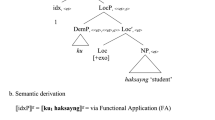Abstract
This paper shows that the semantics of shenme ‘what’ in Chinese bare conditionals may exhibit a phenomenon of double quantification. I argue that such double quantification can be nicely accounted for if one adopts Carlson's (1977a, b) semantics of bare plurals and verb meanings as well as the following two assumptions: (i) shenme ‘what’ can be a proform of bare NPs and hence has the same kind of denotation as bare NPs, and (ii) Chinese bare NPs are names of kinds of things. This analysis of Chinese bare conditionals lends support to Carlson's approach to bare plurals despite Wilkinson's (1991) criticisms. I also show that an extension of Heim's (1987) analysis of what as ‘something of kind x’ to Chinese shenme ‘what’ encounters problems when shenme ‘what’ is a shared constituent of a predicate which applies to kinds and another predicate which applies to objects.
Similar content being viewed by others
References
Bennett, Michael: 1974, Some Extensions of a Montague Fragment of English, UCLA dissertation [published 1976 by Indiana University Linguistics Club Bloomington].
Carlson, Gregory N.: 1977a, ‘A Unified Analysis of the English Bare Plural’, Linguistics and Philosophy 1, 413–456.
Carlson, Gregory N.: 1977b, Reference to Kinds in English, Ph.D. Dissertation, University of Massachusetts, Amherst.
Carlson, Gregory N. and Francis Jeffry Pelletier: 1995. The Generic Book, The University of Chicago Press, Chicago and London.
Cheng, L.-S. Lisa and C.-T. James Huang: 1996. ‘Two Types of Donkey Sentences’, Natural Language Semantics 4, 121–163.
Diesing, Molly: 1990, The Syntactic Roots of Semantic Partition, Ph.D. Dissertation, University of Massachusetts, Amherst.
Diesing, Molly: 1992, Indefinites, The MIT Press, Massachusetts.
Dowty, David: 1987, ‘Collective Predicates, Distributive Predicates, and All’, in Proceedings of ESCOL 3, Ohio State University, pp. 97–115.
Dowty, David and Belinda Brodie: 1984, ‘The Semantics of “Floated Quantifiers” in a Transformationless Grammar’, in Proceedings of WCCFL 3, CSLI, Stanford University, Stanford, pp. 75–90.
Heim, Irene: 1982, The Semantics of Definite and Indefinite Noun Phrases, Ph.D. Dissertation, University of Massachusetts, Amherst.
Heim, Irene: 1987, ‘Where Does the Definiteness Restriction Apply? Evidence From the Definiteness of Variables’, in Eric J. Reuland and Alice G. B. ter Meulen (eds.) The Representation of (In)definiteness, MIT Press, Cambridge.
Hoeksema, Jack: 1983, ‘Plurality and Conjunction’, in Alice G. B. ter Meulen (ed.) Foris, Dordrecht, 63–84.
Huang, C.-T. James: 1987, ‘Existential Sentences in Chinese and (In)definiteness’, in Eric J. Reuland and Alice G. B. ter Meulen (eds.) The Representation of (In)definiteness, MIT Press, Cambridge, 226–253.
Kadmon, Nirit: 1987, On Unique and Non-unique Reference and Asymmetric Quantification, Ph.D. dissertation, University of Massachusetts, Amherst.
Kamp, Hans: 1981, ‘A Theory of Truth and Semantic Interpretation’, in Jeroen Groenendijk, Theo Janssen, and Martin Stokhof (eds.), Formal Methods in the Study of Language: Proceedings of the Third Amsterdam Colloquium, Part I, Mathematical Centre Tracts, Amsterdam, pp. 277–321.
Kratzer, Angelika: 1978, Semantik der Rede: Kontext-theorie, Modalwörter, Konditionalsätze, Scriptor, Königstein.
Krifka, Manfred: 1995, ‘Common Nouns: A Contrastive Analysis of Chinese And English’, in Gregory N. Carlson and Francis Jeffry Pelletier (eds.), The Generic Book, The University of Chicago Press, Chicago and London.
Lin, Jo-wang: 1994, ‘Object Expletives, Definiteness Effect and Scope Interpretation’, in Merce Gonzalez (ed.), Proceedings of North Eastern Linguistic Society 24 (NELS 24), GLSA, University of Massachusetts, Amherst, Massachusetts.
Lin, Jo-wang: 1996, Polarity Licensing And Wh-phrase Quantification in Chinese, Ph.D. dissertation, University of Massachusetts, Amherst, Massachusetts.
Link, Godehard: 1983, ‘The Logical Analysis of Plurals and Mass Terms: A Lattice-theoretic Approach’, in Rainer Bäuerle, Christoph Schwarze, and Arnim von Stechow (eds.), Meaning, Use, and Interpretation of Language, de Gruyter, Berlin, pp. 302–323.
Safir, Kenneth: 1985, Syntactic Chains, Cambridge University Press, New York.
Stump, Gregory T.: 1985, The Semantic Variability of Absolute Constructions, Reidel, Dordrect.
Scha, Remko: 1981, ‘Distributive, Collective and Cumulative Quantification’, in J. Groenendijk, T. Janssen and M. Stokhof (eds.), Formal Methods in the Study of Language, Mathematical Center Tracts, Amsterdam, pp. 483–512.
Wilkinson, Karina: 1991, Studies in the Semantics of Generic Noun Phrases, Ph.D dissertation, University of Massachusetts, Amberst, Massachusetts.
Author information
Authors and Affiliations
Rights and permissions
About this article
Cite this article
Lin, JW. Double Quantification and the Meaning of Shenme ‘What’ in Chinese Bare Conditionals. Linguistics and Philosophy 22, 573–593 (1999). https://doi.org/10.1023/A:1005593100617
Issue Date:
DOI: https://doi.org/10.1023/A:1005593100617



